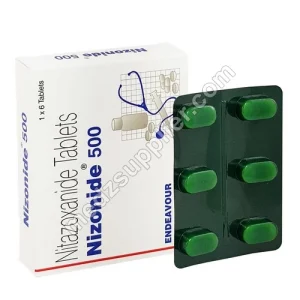Introduction to Nizonide 500mg
Nizonide 500mg is a medication primarily used to treat parasitic and protozoal infections. Its active ingredient, Nitazoxanide, belongs to the class of broad-spectrum antiparasitic and antiviral agents. This drug is effective in treating infections such as giardiasis, cryptosporidiosis, and certain intestinal infections caused by protozoa or helminths. It may also be prescribed off-label for viral gastroenteritis.
This article discusses the key considerations, side effects, precautions, and uses of Nizonide 500mg to ensure safe and effective treatment.
Key Uses of Nitazoxanide 500mg
Treatment of Parasitic Infections
Nitazoxanide is widely used for infections like giardiasis (caused by Giardia lamblia) and cryptosporidiosis (caused by Cryptosporidium parvum). These infections often result in diarrhea and abdominal discomfort.
Management of Helminthic Infections
It can treat worm infestations, such as those caused by Ascaris lumbricoides and Enterobius vermicularis.
Treatment of Gastrointestinal Infections
Nizonide 500mg is prescribed for conditions like viral diarrhea due to rotavirus and norovirus, particularly in children and adults.
Adjunct in Hepatitis B and C
Some studies suggest Nitazoxanide's potential role in controlling viral replication, making it useful as part of combination therapy for chronic hepatitis.
Off-Label Uses
It has been explored as a treatment option in COVID-19 due to its broad antiviral properties, though this is not a primary indication.
How Nitazoxanide 500mg Works
Nitazoxanide exerts its antiparasitic and antiviral effects by inhibiting the enzyme pyruvate:ferredoxin oxidoreductase, crucial for energy metabolism in anaerobic organisms. By disrupting energy production, it effectively kills parasites and some viruses.
Precautions Before Taking Nizonide 500mg
Before starting nitazoxanide 500mg, you must understand its potential risks and benefits:
1. Medical History
Inform your doctor if you have
- Liver or kidney disease
- Immune system disorders
- A history of alcohol consumption, which may affect liver function
- Any known allergies to Nitazoxanide or its excipients
2. Pregnancy and Breastfeeding
- The safety of Nitazoxanide in pregnant women is not well-established. Consult your doctor to evaluate potential risks and benefits.
- While there is limited data on its secretion in breast milk, caution is advised during breastfeeding.
3. Age-Related Considerations
- Children Nitazoxanide suspension is often preferred for children below 12 years to ensure accurate dosing.
- Elderly No specific dosage adjustment is typically required unless they have impaired liver or kidney function.
4. Drug Interactions
- Avoid combining Nitazoxanide with medications that affect the liver, such as statins or antiepileptic drugs, without medical advice.
- Inform your doctor if you are taking immunosuppressive drugs, blood thinners, or medications metabolized by the liver.
5. Dietary Restrictions
Take the medication with food to enhance its absorption. Avoid alcohol, as it may exacerbate side effects like nausea or liver strain.
6. Pre-Existing Conditions
Those with gastrointestinal ulcers or chronic diarrhea may experience worsened symptoms. Dose adjustments may be necessary.
How to Take Nizonide 500mg
Dosage and Administration
Follow your doctor’s prescribed dosage. For adults, the typical dose is 500mg twice daily for 3 days, but this may vary based on the infection being treated.
Take the tablet with meals to reduce gastrointestinal discomfort and improve absorption.
Missed Dose
If you miss a dose, take it as soon as you remember. However, if it’s close to your next dose, skip the missed dose and continue with your regular schedule.
Overdose
Overdosing on Nitazoxanide can lead to increased side effects, including severe gastrointestinal discomfort. Seek immediate medical attention if an overdose is suspected.
Possible Side Effects of Nitazoxanide 500mg
While Nitazoxanide is generally well-tolerated, some patients may experience side effects. Common and rare side effects include:
1. Common Side Effects
- Nausea
- Vomiting
- Abdominal pain or cramps
- Diarrhea
- Headache
2. Rare but Serious Side Effects
- Allergic reactions: Rash, itching, swelling, or difficulty breathing
- Yellowing of the skin or eyes (jaundice), indicative of liver issues
- Severe fatigue or dark-colored urine, signs of potential liver or kidney problems
3. Management of Side Effects
- Mild side effects often resolve without intervention. Drinking plenty of fluids can help counteract dehydration caused by diarrhea or vomiting.
- Notify your doctor if side effects persist or worsen.
Safety Tips While Using Nizonide 500mg
Avoid Self-Medication
Do not take Nitazoxanide without a confirmed diagnosis of parasitic or protozoal infection. Misuse can lead to resistance.
Complete the Full Course
Ensure you complete the prescribed course, even if symptoms improve, to prevent the infection from returning or developing drug resistance.
Storage
Store Nizonide 500mg at room temperature, away from direct sunlight and moisture.
Avoid Driving or Operating Heavy Machinery
If you experience dizziness or fatigue, refrain from activities that require concentration.
Regular Monitoring
For prolonged use, regular liver function tests may be recommended to detect any adverse effects early.
When to Contact a Doctor
Seek medical advice if you
- Experience severe or persistent side effects
- Notice signs of an allergic reaction, such as hives or swelling
- Have a significant worsening of symptoms despite treatment.
Frequently Asked Questions About Nitazoxanide 500mg
Can Nizonide 500mg treat bacterial infections?
No, Nitazoxanide is ineffective against bacterial infections. It targets protozoa, helminths, and certain viruses.
Is Nitazoxanide 500mg safe for long-term use?
Long-term use is uncommon and should only be under strict medical supervision due to potential liver strain.
Can I take Nizonide 500mg with antibiotics?
This depends on the condition being treated. Always consult your doctor before combining medications.
Does Nitazoxanide affect gut microbiota?
Nitazoxanide is less likely to disrupt gut microbiota compared to broad-spectrum antibiotics, but mild effects on gut flora may occur.
Can Nitazoxanide prevent infections?
Nitazoxanide is not used for prophylaxis. Its role is strictly therapeutic.
Conclusion
Nitazoxanide 500mg (Nizonide 500mg) is a highly effective medication for parasitic and protozoal infections when used as directed. Understanding its proper use, potential side effects, and precautions ensures better outcomes. Always consult a healthcare provider before starting treatment and follow the prescribed regimen diligently. For any concerns or persistent symptoms, seek medical advice promptly.




